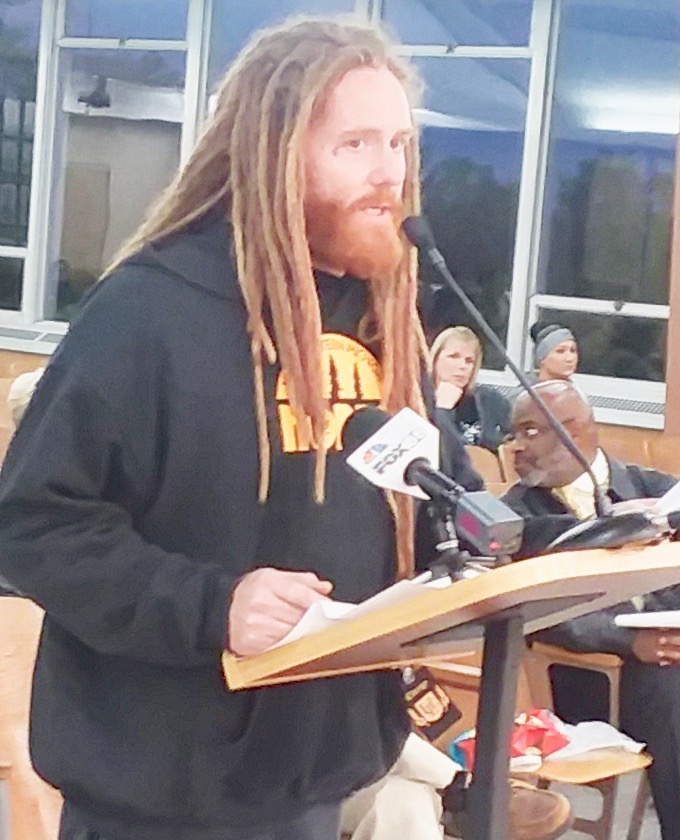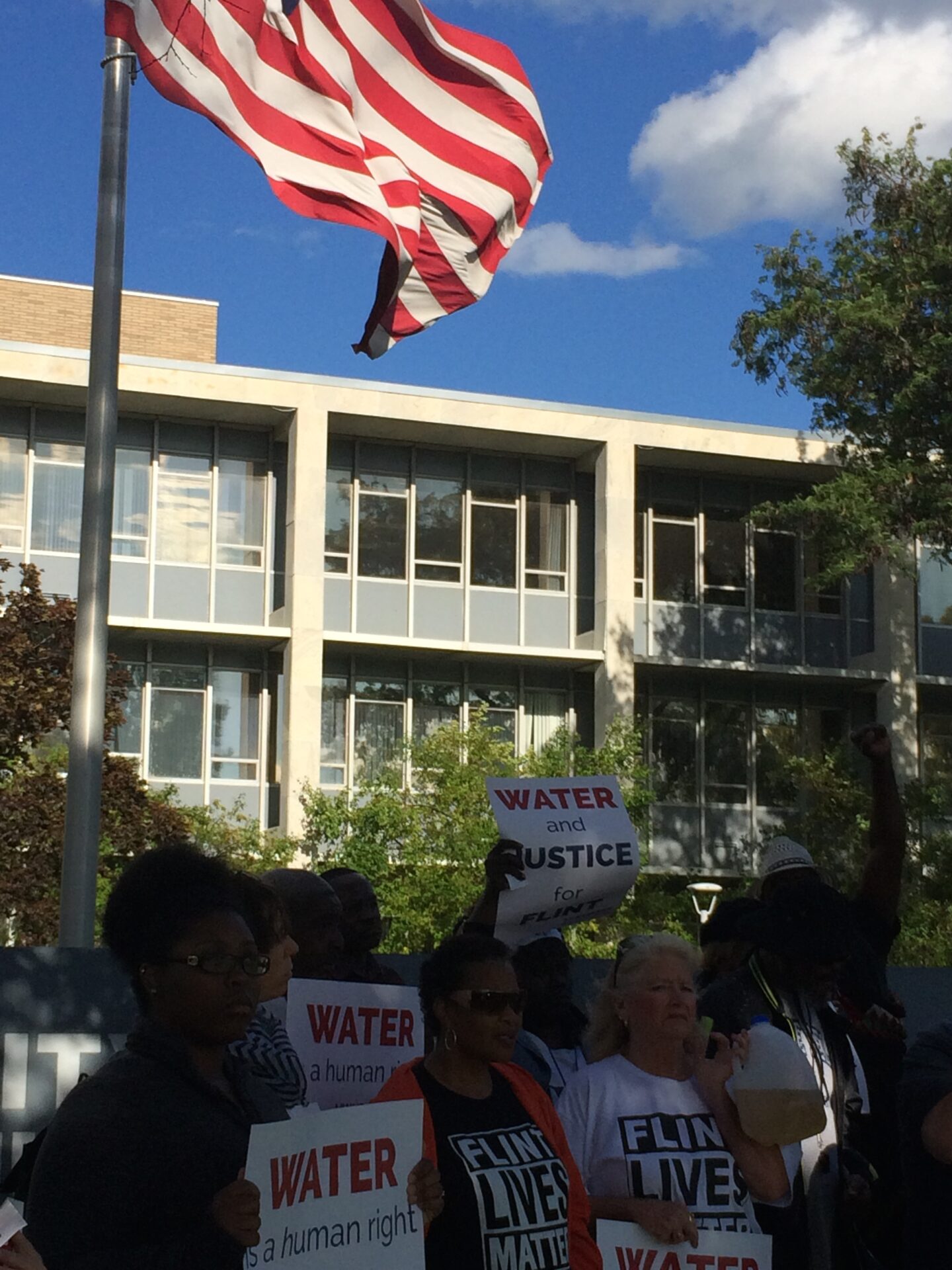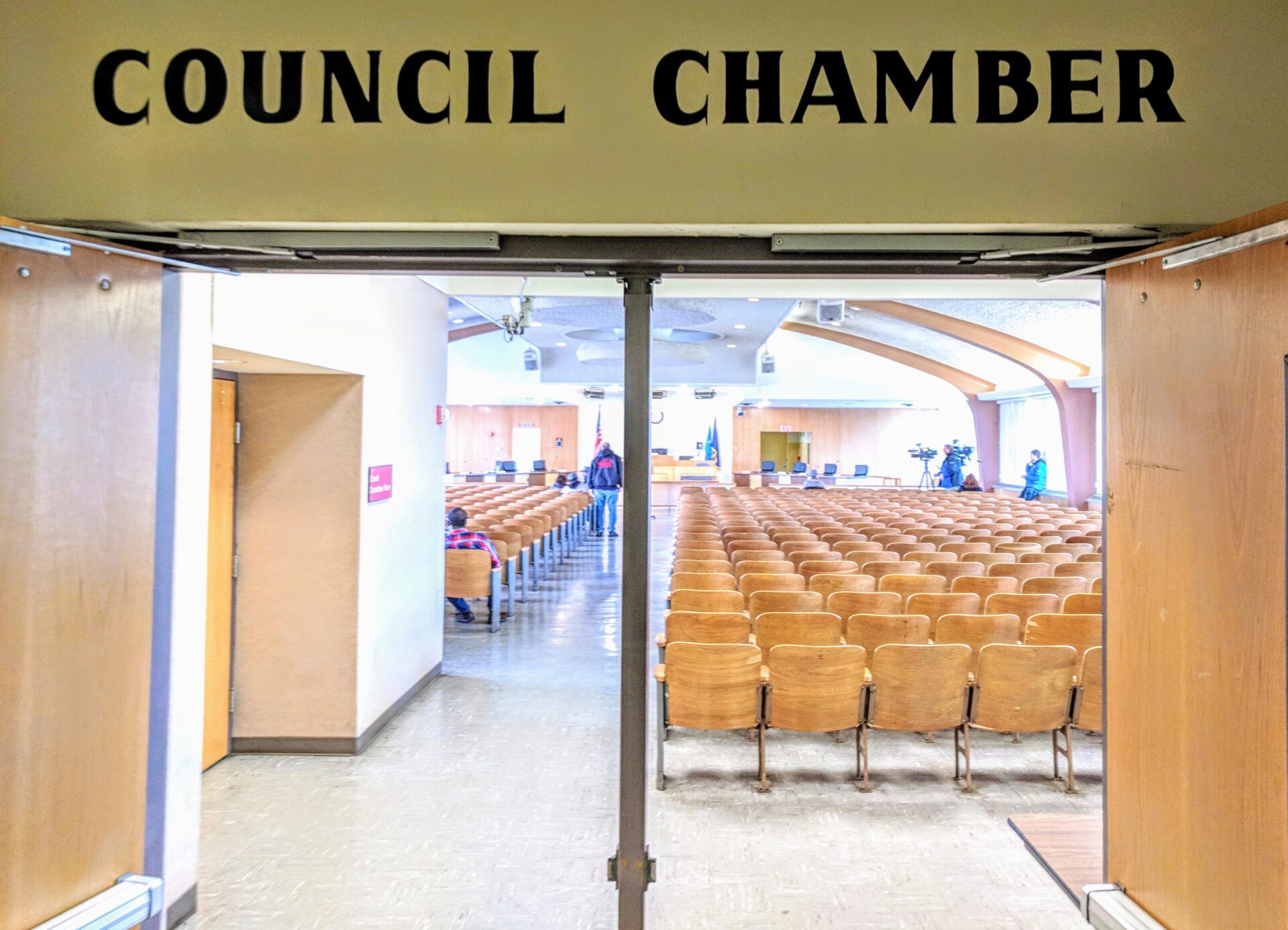By Luther Houle
An uncharacteristic turnout of about 60 Flint residents appeared at the Oct. 14 City Council meeting to voice their opinions and observe the city’s legislative process. Their reason for coming: a proposed “opt-out” ordinance that would limit which businesses would be able to get recreational marijuana licenses.
After a public hearing and council discussion, the ordinance failed to pass on a 4-4 split vote, with the city having until Nov. 1, a state deadline, to consider further action or cede to state rules.
Why is action needed?
In November, 2018, Michigan residents voted yes on Proposition 1 to legalize the sale and consumption of recreational marijuana. The proposition also gave municipalities certain rights to control the creation of “marijuana establishments” within their limits.
 Medical marijuana was legalized in Michigan in 2008, meaning that many establishments already are in place providing medical cannabis to qualified users. The issue then is how to add or incorporate recreational cannabis options.
Medical marijuana was legalized in Michigan in 2008, meaning that many establishments already are in place providing medical cannabis to qualified users. The issue then is how to add or incorporate recreational cannabis options.
A marijuana establishment is defined by the state as any location that grows more than 12 marijuana plants, or processes, tests, transports, or sells marijuana and marijuana accessories.
According to the Michigan House of Representatives, a city such as Flint may limit or prohibit marijuana establishments within its boundaries. Municipalities can also regulate the time, place, and manner of operation of these establishments, and the sale and display of marijuana accessories.
A FAQ sheet provided by the City’s legal department at Monday’s City Council meeting helped explain the proposed ordinance to the council, the audience, and the press.
Failed “temporary placeholder” ordinance had three parts
According to the legal department, the proposed ordinance would have done only three things:
First, temporarily prohibit new recreational marijuana licenses from being issued for one year.
Second, allow already licensed medical marijuana facilities to receive their equivalent recreational marijuana licenses immediately.
Finally, automatically repeal after one year of its adoption.
The handout stated the ordinance was meant to be a temporary placeholder until a more comprehensive ordinance can be drafted which would allow for better control over how and where recreational marijuana can be sold.
Not acting means ceding to state implementation
It states that the Michigan Regulation and Taxation of Marihuana Act (MRTMA) mandates that, if the City does not have its own ordinance in place by Nov. 1, any marijuana establishments that apply for a license will be granted one “without any City approval or review for locations, safety, or compliance with zoning code.”
The FAQ sheet further states that the City currently has a comprehensive medical marijuana ordinance in place which separates medical marijuana businesses from “residential neighborhoods, schools, parks and places of worship,” and that without an ordinance, recreational facilities would be free from these restrictions.
It summarizes by restating that the ordinance’s purpose is to give the City additional time to draft a permanent recreational marijuana ordinance, while still allowing for immediate access to recreational marijuana from already licensed medical facilities.
Citizens respond with concern for local economy
During a public hearing on the ordinance. 12 people stepped up to share their concerns. They were almost unanimously against the proposition for one reason: They claimed the ordinance would be unfair to small businesses.

Jason Durham (Photo by Luther Houle)
Jason Durham, who introduced himself as Reverend for the First Cannabis Church of Logic and Reason, and secretary for the Michigan chapter of the National Organization for the Reform of Marijuana Laws (NORML), spoke first.
“To allow a business who has put up millions of dollars to get into the medical industry instant recreational licensing, gives them the monopoly for no less than one year,” Durham said.
He explained few shops have licenses for medical facilities. He contended that by having a monopoly, the established medical dispensaries would control the prices, and people will have to travel great distances to reach the smaller merchants.
“You’re giving favoritism to these few elites. These elites that have this licensing now, they’re millionaires. They don’t need any more money, but they’re getting it.”
Durham also argued more pot shops are needed.
“We have a liquor store on almost every corner. If we can have liquor stores and bars and the sky’s not falling, then why wouldn’t we allow our citizens to take that choice and go to a club where they can be with like minded individuals, consume responsibly, and then go back home to their productive lives? This gives relief to people.”
The information provided at the meeting did not indicate that the ordinance would allow licenses for consumption lounges.
In a follow-up interview, asked about the money that would go to the already established medical marijuana providers in town, Durham reiterated, “None of that money is staying in the community. Moms and Pops should have a fair shot at it.”
Durham said the City has had plenty of time to draft a comprehensive recreational marijuana policy since residents voted for recreational pot in 2018. Now the city is rushed to pass a temporary resolution before they automatically “opt-in” to state regulations on Nov. 1.
He provided an alternative plan to give small businesses a fair chance. “Why not limit it to no more than the number of liquor stores in a community?” He proposed that they make the process of getting a recreational marijuana license similar to the process of getting an alcohol license.
Other speakers shared Durham’s concerns.
“Are we putting things in place that benefit the people of the City of Flint to where the money stays here in Flint?” resident and frequent council commentator Arthur Woodson asked.
“Why not promote individual rights? Why not promote businesses?” Keith Olson asked. “Every member of this community could make money. Grow some cannabis, sell it to the facility, pay taxes, all that.”
Council Weighs in
In Council discussion of the ordinance following the public hearing, Councilperson Eric Mays (Ward One) moved to postpone the decision until the next meeting, which still would fall before the Nov. 1. state deadline. He said he hoped a better ordinance could be drafted by then–one that would address citizens’ concerns.
Councilperson Kate Fields (Ward Four) disagreed, suggesting council adopt the proposal to “opt-out” now, then repeal the ordinance and “opt back in” next month once clearer regulations are drafted.
“What is the big dang rush?” she asked. “Is somebody going to lose $100 in this next month?… I would rather see us regulate these properly and give our city attorneys time to help us put the regulations into order.”
Councilperson Santino Guerra (Ward Three) also did not support postponing, stating that if the ordinance is adopted, council could meet “even tomorrow” for a special meeting to have a new ordinance put into place.
The motion to postpone failed in a four to four vote with Councilpersons Winfrey-Carter, Winfrey, Mays, and Davis supporting and Worthing, Griggs, Fields, and Guerra opposing. Councilperson Monica Galloway was not present.
The council then returned to the original motion to adopt the ordinance.
This motion failed in a four to four vote with Councilpersons Winfrey-Carter, Winfrey, Mays, and Davis voting against the ordinance, and Worthing, Griggs, Fields, and Guerra voting in favor.
As Mays said before the vote, “This will force the legal department to go back to the drawing board.”
Now, the City only has until Nov. 1 to pass an ordinance setting out city regulations, or else it will automatically be “opted in” to state law, placing marijuana establishments under minimum restrictions as to where and how they operate their business.`
EVM Staff Writer Luther Houle can be reached at lutherbhoule@gmail.com.








You must be logged in to post a comment.